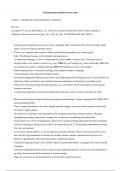Class notes
Educational Psychology lecture notes (academic year 2023/2024)
- Course
- Institution
Comprehensive summary of all seven lectures. All topics are clearly described, in some cases information from the literature added to clarify when, in my opinion, the course was too short of a curve. The corresponding book chapters and/or articles are listed at the top.
[Show more]



